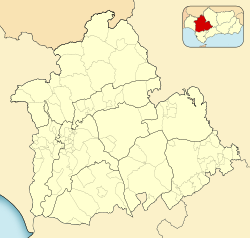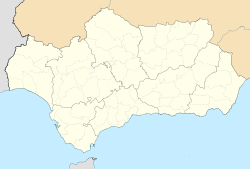Castilblanco de los Arroyos | |
|---|---|
city | |
| Coordinates: 37°40′30″N5°59′20″W / 37.67500°N 5.98889°W | |
| Country | |
| Region | |
| Province | Seville |
| Municipality | Castilblanco de los Arroyos |
| Area | |
• Total | 325 km2 (125 sq mi) |
| Elevation | 313 m (1,027 ft) |
| Population (2018) [1] | |
• Total | 4,810 |
| • Density | 15/km2 (38/sq mi) |
| Time zone | UTC+1 (CET) |
| • Summer (DST) | UTC+2 (CEST) |
Castilblanco de los Arroyos is a city located in the province of Seville, Spain. According to the 2006 census (INE), the city has a population of 4870 inhabitants.



